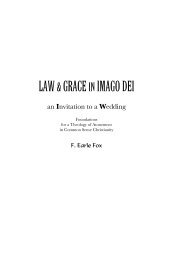Download entire 232-page book HERE (PDF ... - MassResistance
Download entire 232-page book HERE (PDF ... - MassResistance
Download entire 232-page book HERE (PDF ... - MassResistance
Create successful ePaper yourself
Turn your PDF publications into a flip-book with our unique Google optimized e-Paper software.
in – and base public policy upon it -- without violating the law or being silenced by liberal opponents.<br />
It is neither necessary nor desirable to silence anti-family voices, so long as the pro-family<br />
ones are allowed to compete equally in the marketplace of ideas. We believe that pro-family ideas,<br />
reasonably and clearly expressed, will win the day.<br />
What follows is a reasoned argument for the pro-family position in <strong>entire</strong>ly nonreligious<br />
terms to help you explain the logic of pro-family thinking to non-believers.<br />
Religious or Secular?<br />
Too often the “conservative” or pro-family position on issues such as homosexuality and<br />
abortion is assumed to be <strong>entire</strong>ly religious in nature, while the “liberal” or pro-choice position is<br />
assumed to be non-religious. This misunderstanding leads some to believe that the pro-family<br />
viewpoint cannot be advocated by school teachers and other public officials without violating the<br />
Establishment Clause of the First Amendment (the so-called “separation of church and state“). This<br />
is a false conclusion.<br />
While it is true that most world religions are doctrinally pro-family, and that many of the<br />
most vocal advocates of the pro-family position are strongly religious people, the belief in the natural<br />
family, marriage and family values is not inherently religious. Indeed, the “father” of pro-family<br />
argumentation is the ancient Greek philosopher, Aristotle, an <strong>entire</strong>ly secular figure in world history.<br />
The essence of the pro-family perspective is a belief in empirical observation and logical<br />
deduction. Aristotle gave the name “teleology” to this approach to understanding the world.<br />
Teleology assumes that all things have a purpose and that the purpose of each thing can be discerned<br />
from its design and function.<br />
For example, we can determine that the purpose of the eye is to see, since it is obviously<br />
designed to do so and that is how it functions.<br />
Another name for Aristotle’s philosophy is natural law, although his definition of this term is<br />
different from that of some later philosophers. One group of natural law thinkers of whom Aristotle<br />
would likely have approved is America’s founding fathers. Their Declaration of Independence from<br />
British rule claims its authority from “inalienable rights” deduced from “self-evident truths” emanating<br />
from “Nature and Nature’s God.”<br />
Another important natural law document is the Universal Declaration of Human Rights,<br />
adopted by the United Nations 1948. Its reaffirmation of “the inherent dignity and of the equal and<br />
inalienable rights of all members of the human family” is the legal and moral inspiration for nearly<br />
every human rights treaty provision in international law.<br />
The common denominator in these examples of natural law thinking is an adherence to the<br />
belief that observations about what is can guide us as to what ought to be.<br />
In like manner, activists in today’s pro-family movement believe that the optimal approach<br />
to dealing with social problems, particularly those associated with sexual behavior, can be deduced<br />
from observations of and respect for the self-evident nature of things. Simply, we choose to assume<br />
that following the design of things will produce good results while ignoring the design will produce<br />
Redeeming the Rainbow 86






